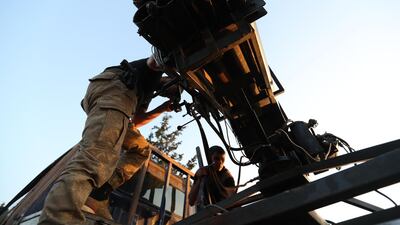Syrian rebels in the last bastion of opposition to President Bashar Al Assad have held on to a strategic mountain position amid a redoubled push by government forces and its allies to wrest the territory.
The Kubyana range in the north-west province of Latakia, where Mr Al Assad’s family is from, has become the latest flashpoint in the Syrian army’s final push to armed opposition groups from the country after nearly eight years of conflict.
Over the weekend, rebels said they had repelled another Syrian government attempt to take the mountain, a position which they said effectively ensured control over a broader area under their firing range.
The Syrian government’s push to rout armed opposition groups from the northern Idlib province, which is home to about three million people, has intensified in recent weeks. Regime troops have focused on retaking a major highway that runs through the rebel enclave.
Russia, the Syrian regime’s most committed military backer, announced a 72-hour unilateral ceasefire over the weekend which quickly collapsed, with reports of rebels and government forces continuing fighting.
Russia’s defence ministry on Monday said that it had repelled a drone and missile attack on its Hmeimim military base on the western coast of Syria. The state-run Ria Novosti news agency quoted defence officials as saying that rebels of the former Nusra Front were responsible for the attack.
A spokesman for the Tahrir Al Sham group, the latest iteration of the Nusra Front, which was affiliated with Al Qaeda, claimed that Syrian government forces had used chemical weapons during the assault on Kubyana. Reuters cited a Tahrir Al Sham fighter saying that several members of the group had suffered “choking symptoms”.
In comments to state media on Monday, Syria's defence ministry denied reports it had used chemical weapons. The foreign ministry said the government had never used chemical weapons and had not kept stockpiles of chemical weapons.
The government’s renewed to push out Islamist fighters from Idlib all but signals the end of a fragile pause in hostilities brokered between Turkey and Russia in September last year.
The Syrian government, as well as top officials in the Russian government, are eager to gain control over Idlib and draw a conclusive military victory for Damascus.
In Turkey, however, officials are worried that the Syrian regime’s full-scale assault on Idlib will force millions of refugees into the south of their country and further strain Ankara’s efforts to host more than three million Syrians who have been displaced by the eight-year conflict.
The renewed fighting in northern Syria has already displaced as many as 180,000 people, the UN said last week during an emergency Security Council meeting.
Mark Lowcock, the UN humanitarian affairs co-ordinator, said at least 18 hospitals and clinics had been destroyed or damaged during the fighting despite all parties to the conflict being notified of the exact locations of health facilities.
Some 49 health centres had suspended their services, while 17 schools were either levelled or partially destroyed and many more had closed, he said.
Turkish President Tayyip Erdogan admonished his Russian counterpart Vladimir Putin for the attacks on civilian infrastructure during a recent phone call, saying "the fact that schools, hospitals and civilians are targeted has no place in a proper fight against terror".

